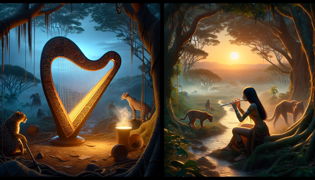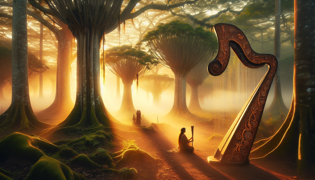Introduction
Deep inside the Yhaguy Forest, where vines hang like gilded curtains and hummingbirds flit as swift as living jewels, there sits a hidden clearing. Under a canopy woven of orchids and kapok blossoms, legends whisper among the palms and tell of a harp so ancient its wood remembers the first breath of creation. Che, mirá vos: no one speaks of the harp without a shiver, as if the forest itself leans closer to eavesdrop. Our tale begins with Arami, a shy young musician whose heart beat in time with the wind, whose fingers danced across a flute like sunbeams on water. While other children chased capybaras through the reeds, she wandered deeper, her bare feet silent on the leaf-littered floor. More perdido que turco en la neblina, she lost track of time until moonlight guided her path back, following constellations as if they were old friends. Yet even in dreams she heard the harp’s distant call, a melody weaving like vines among her thoughts. They said the harp could summon rain or calm the stingiest storm, for it belonged to Ñamandu, spirit of rivers and thunder. Ojo al piojo! Some warned her—many had tried to claim its power and returned empty-handed, hearts weighed down by echoes they could never silence. But Arami felt an ember of destiny kindle within her chest, stubborn as a mango tree in bloom. Her journey would test every chord of courage and compassion in her soul, revealing truths older than the grandest ceiba tree.
Echoes of Ancestral Strings
Arami awoke before sunrise, the forest still draped in shadow, its breath a tapestry of dewdrops and distant birdcalls. Clutching her slender flute, she returned to the clearing, every branch and boulder now familiar as an old friend. The harp stood at the center like a sleeping giant, its form carved from ancient guapuruvu wood, inlaid with silver filigree matching patterns she’d seen on tribal shields. Each string shimmered with a color more alive than any rainbow, humming softly—like firefly wings brushing silk. She reached out, heart pounding like a fiesta drum in her chest, and plucked a single chord. The sound spilled into the air, resonant as thunder but tender as a mother’s lullaby. Leaves trembled overhead, and the forest exhaled in response, a thousand tiny creatures holding their breath. Then came a murmur from the undergrowth: Guaracy, spirit of dawn, emerged with eyes bright as liquid gold. His presence was at once comforting and awe-inspiring, an embodiment of daylight’s promise. “Arami,” he spoke, voice rippling through the trees like a mountain stream, “the harp’s song carries the memory of our people. Only a heart pure as morning dew can unlock its true melody.”
She bowed her head, every nerve alive with anticipation. Memories flickered in her mind—stories her grandmother told by firelight, of brave hunters and wise herbalists who once united villages through music’s healing power. No hay más vueltas, Arami thought: this was her moment. Her fingers trembled across the strings, weaving a motif old as earth itself, and she felt the harp lean into her touch as if recognizing kinship. The melody deepened, altering with each breath: it spoke of raging rivers and patient roots, of love that endures beyond the tomb, of renewal after every drought. Then a sudden crack rent the air as thunderclouds gathered beyond the canopy, dark as obsidian. Rain pelted the leaves, yet the harp’s song grew louder, guiding the storm’s rage into a gentle downpour that kissed seedlings awake. The forest floor glowed with phosphorescent toads and orchids opening like tiny suns, responding to the ancient chord. More amazed than frightened, Arami saw that each note she struck tuned the world itself. Shadows retreated, revealing animals emboldened by the tune: a jaguar paused on a fallen log, ears pricked to listen; toucans alighted on slender branches, their voices joining in trills and caws. She was no longer merely a musician. She had become a bridge between flesh and spirit, past and future, humankind and forest. As the final note faded, Guaracy lingered by her side, wind ruffling her hair. “You have done well,” he whispered, the words lingering like pollen on the breeze. “But remember: this gift carries weight. The harp’s power must serve all, not just one.”

Trials Beneath the Ceiba
Word of the harp’s revival spread like wildfire through nearby villages, carried on the wings of parrots and traders’ whispers. Some came seeking blessing, others craving power. Among them was Yvera, a proud cacique whose ambition stretched beyond the hills. He arrived with warriors clad in jaguar hides, eyes gleaming like polished obsidian. Under a towering ceiba tree—its roots knotted like ancient wisdom—Yvera demanded dominion over the harp. Arami refused, voice steady as a riverbed. “El que quiera paz, que se quite de la guerra,” she reminded them, borrowing her grandmother’s words, “for the harp sings only for harmony.”
Anger twisted Yvera’s grin into a jagged scar. He signaled his men; axes and spears gleamed under midday sun. The forest recoiled as though wounded. Birds scattered, cries sharp as broken glass. Arami lifted her flute and played a soft lament, each note drifting like loose petals on a breeze. Guaracy emerged once more, coalescing the wind around him. “Defend what is just,” he commanded, eyes bright as lightning bugs. With a gesture, vines erupted from the earth, wrapping Yvera’s warriors in living bonds. Some screamed as tendrils twined around their ankles; others froze, heartbeats echoing in their throats. Yvera roared and charged, but the tangle of roots and leaves formed a living barricade. Arami’s song rose in intensity, stirring the soil until saplings sprouted at her command—green warriors of leaf and thorn.

“Manduvi rejávo!” she shouted, invoking the peanut spirit, a local expression for unexpected strength. The new guardians closed ranks, forcing Yvera back beneath the ceiba’s watchful limbs. His pride shattered like broken clay, he dropped to one knee. “I was blind,” he whispered, head bowed. “Teach me to hear as you do.” Tenderness bloomed within Arami’s chest, as pure as a moonlit orchid. She released the healing chord, and the forest exhaled in relief. Vines eased their grip; warriors rose, humbled. The ceiba’s great trunk seemed to pulse in approval, its canopy shading the clearing like an all-embracing quilt. Yvera joined Arami beside the harp, his voice small as a fallen leaf. “I vow to protect this gift,” he said, tears tracking through dust. “May its music bind us, not break us.”
In the hush that followed, Arami taught him the opening phrase of the harp’s melody—a prayer disguised as music. Together, they coaxed new life from the forest floor: mushrooms bloomed in fractal patterns, frogs sang in chorus, and the song traveled down hidden waterways to quench parched fields. Even the air itself felt restored, carrying a scent of fresh guava and promise. Under the ceiba’s sprawling arms, alliances formed stronger than any iron. Arami smiled, flute dangling at her side like a loyal friend. The harp had passed its trial beneath the ceiba, and the legend took root in human hearts as surely as the tree’s roots gripped the earth.
Melody of Unity and Renewal
Seasons turned their eternal wheel, and the harp’s influence blossomed beyond the forest. Rivers once choked with sediment ran clear as polished quartz; fields yielded golden harvests without toil’s harsh pang. Villagers gathered monthly at the Yhaguy clearing, bringing offerings of yucca bread and honeycomb, playing tambourines and maracas to join Arami’s harp. The air hummed like an immense woven tapestry, each strand a life bound to the others. Guaracy watched from misty heights, his smile a sunrise of contentment.
But peace is a river that must be guided, not dammed. One night, a celestial eclipse cloaked the moon in charcoal. With the sky darkened, a tremor shook the land—whispers of a slumbering jaguar spirit awakened by unheeded greed. Its roar echoed through hidden caves, and the ground cracked where roots had once held firm. Fear slithered through villagers like a shadow snake, coiling around hearts.

Arami knew what she must do. Alone, she carried the harp to the riverbank and placed it on a flat stone. Water lapped at her feet, cool and insistent. She lifted her hands to the strings, remembering every chord taught by the forest. As her music rang out, ripples danced across the surface like liquid glass. Under the eclipse’s dark veil, the hymn summoned the jaguar spirit itself—a majestic phantom, fur embroidered with starlight, eyes glowing like sunset embers. The great cat circled warily, nostrils flaring at Arami’s steady rhythm. “I offer you harmony, not sacrifice,” she called in a voice steady as a warrior’s oath. Her melody tangled with the jaguar’s low growl, weaving a pact older than conquest. The spirit’s roar softened to a purr that vibrated through rock and root alike. Then, raising one spectral paw, it pressed gently against the harp’s frame, sealing the covenant.
Light returned to the sky as the eclipse waned, crimson and gold bleeding across the clouds. The jaguar spirit vanished into dawn’s glow, leaving behind only footprints in dew. Arami played a final chord, and the harp’s runes burned bright before dimming to a soft, living ember. Villagers crowded the bank, eyes wide as the world seemed to breathe anew. In that moment, the harp’s true gift was revealed: not dominion over nature, but unity with it. From that day forward, the Guaraní harp resided not in a single pair of hands, but in every beating heart of Paraguay. Its song became the anthem of forest and field, binding people together like vines and melody, teaching them to listen as deeply as the earth itself.
Conclusion
When dawn’s first promise spilled across the canopy, Arami and her people gathered circles of firelight and song. Tales of the harp’s journey spread along trade routes and rivers, carried in drumbeats and whispered prayers. Farmers spoke of rains arriving like old friends, mothers hummed its melodies to soothe restless children, and elders taught new generations to find the ancient chord within their own breath. The Guaraní harp of legends never became a trophy locked away—it instead became a living testament to balance, teaching that every heartbeat can resonate with earth and sky. Like a river that carries both seed and silt, its music flows endlessly, weaving the past into the future. And so long as its story is spoken beneath star-draped skies, the harp will endure, a testament to the strength found when humankind learns to play in tune with nature’s greatest symphony. – Yvoty rerekua, the song of flowers, lives on within each note, guiding hearts toward harmony and reverence for the world we all share.


















